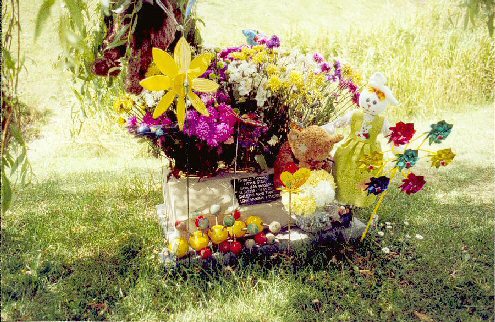Some portrayals of loss and death in poetry

1. It is perhaps a cliche to say that a dearly-loved person was one's whole world. Here is how
W H Auden puts it in 'Funeral Blues':
He was my North, my South, my East, and West,
My working week, and my Sunday rest,
My noon, my midnight, my talk, my song;
I thought that love would last for ever: I was wrong.
How well those few short words - I was wrong - reflect the sense of utter devastation.
2. Rupert Brooke uses a similar technique - a short sentence made up largely of single-syllable words - to contrast the vitality of being alive, with all its rich experiences, with the finality of death in a sonnet titled 'The Dead':
These hearts were woven of human joys and cares,
Washed marvellously with sorrow, swift to mirth.
The years had given them kindness. Dawn was theirs,
And sunset, and the colours of the earth.
These had seen movement, and heard music; known
Slumber and waking; loved; gone proudly friended;
Felt the quick stir of wonder; sat alone;
Touched flowers and furs and cheeks. All this is ended.
3. At the end of the eighteenth century, William Wordsworth wrote a very short poem about a girl who lived a quiet life in a remote spot.
But, little known though Lucy was, Wordsworth expresses the sense of loss when she died:
She lived unknown, and few could know
When Lucy ceased to be;
But she is in her grave, and, oh,
The difference to me!
4. Shakespeare wrote a moving lament in his play Cymbeline The heroine, Imogen,has to flee from her father's court after making a secret marriage. Disguised as a boy, she becomes the page to another exile, Belarius.
However Imogen takes a drug which, apparently, kills her. Belarius's companions. Guiderius and Arviragus, grieve for the dead 'youth'. Their poignant words suggest that
death is a welcome release from the harshness of the world. The words also portray death as the great leveller - it treats everyone alike:
Fear no more the heat o� the sun
Nor the winter�s furious rages;
Thou thy worldly task hast done
Home art gone, and ta�en thy wages;
Golden lads and girls all must
Like chimney-sweepers, come to dust.
Fear no more the frown o' the great.
Thou art past the tyrant's stroke.
Care no more to clothe and eat;
To thee the reed is as the oak;
The sceptre, learning, physic, must
All follow this, and come to dust.
Fear no more the lightning flash,
Nor the all-dreaded thunder-stone;
Fear not slander, censure rash;
Thou hast finish'd joy and moan;
All lovers young, all lovers must
Consign to thee and come to dust.
No exorciser harm thee!
Nor no witchcraft charm thee!
Ghost unlaid forbeear thee!
Quiet consummation have;
And renowned be thy grave.
5. The Victorian Roman Catholic poet and priest, Gerard Manley Hopkins, wrote a sonnet on the death of Felix Randal, a farrier (someone who shoes horses) who had been one of his parishioners.
Hopkins thinks about how Randal's dying has brought them together: his role has been to comfort the dying man and
to give him Holy Communion and the last rites according to Catholic practice. But Hopkins has himself gained from Randal, in experiencing grief and love:
Felix Randal the farrier, O is he dead then? my duty all ended
Who have watched his mould of man, big-boned and hardy-handsome
Pining, pining, till time when reason rambled in it and some
Fatal four disorders, fleshed there, all contended?
Sickness broke him. Impatient he cursed at first, but mended
Being anointed and all; though a heavenlier heart began some
Months earlier, since I had our sweet reprieve and ransom
Tendered to him. Ah well, God rest him all road ever he offended!
This seeing the sick endears them to us, us too it endears.
My tongue had taught thee comfort, touch had quenched thy tears,
Thy tears that touched my heart, child, Felix, poor Felix Randal;
How far from then forethought of, all thy more boisterous years,
When thou at the random grim forge, powerful amidst peers,
Didst fettle for the great grey drayhorse his bright and battering sandal!
Return to Coping with Death index page

